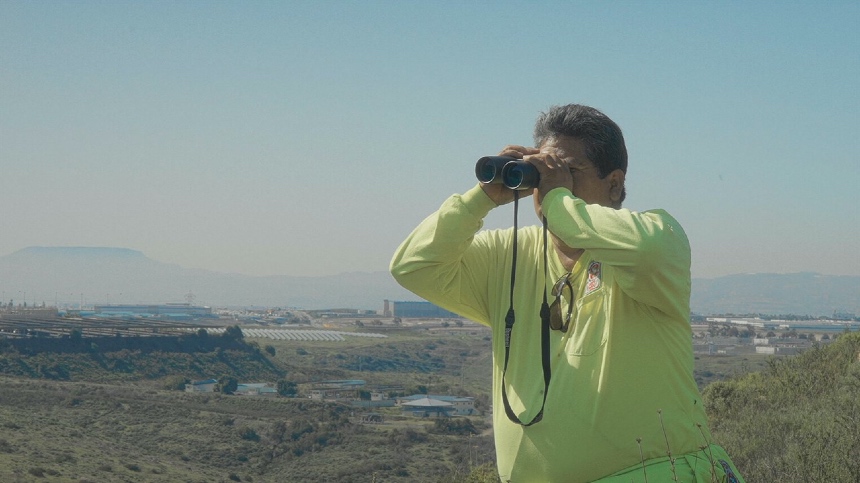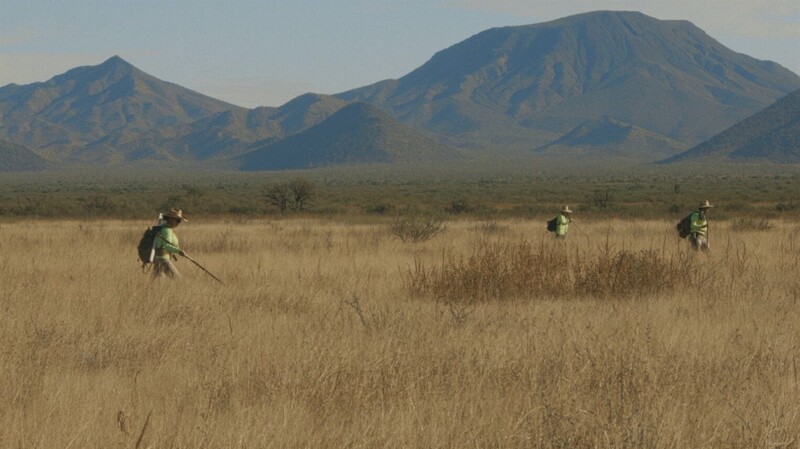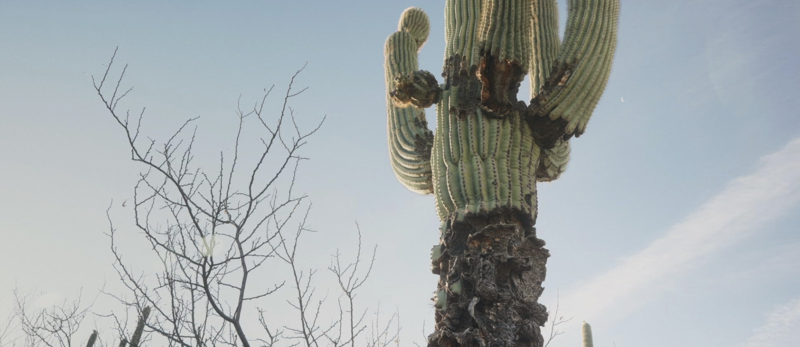Hot Docs 2025 Review: SPARE MY BONES, COYOTE! Illuminates the Human Cost of Border Crossings
Jonah Malak reframes the U.S.-Mexico border as a landscape of absence and loss.

Montreal-based director Jonah Malak focuses on the overlooked peripheries of the U.S.–Mexico border, a political frontier that continues to manifest as a humanitarian fault line, in his latest documentary Spare My Bones, Coyote!. The documentary follows Águilas del Desierto (The Eagles of the Desert), a volunteer group dedicated to locating and recovering the remains of migrants who have gone missing in the desert.
At the center of the film are Marisela and Ely Ortiz, a husband-and-wife team who have been volunteering with the group for more than 12 years. Over the course of three years, Malak documents their efforts, moving between the physically demanding search missions and the quieter rhythms of their domestic life. The film contrasts the urgency of fieldwork with the intimate pauses that frame their ongoing commitment.
The documentary opens with a tense scene involving the possible discovery of a missing person believed to be stranded in the desert. Malak observes the search with restraint, allowing the camera to follow the volunteers as they methodically coordinate efforts to comb through the terrain.
As the search continues, a deeper reality emerges, one that Ely later articulates explicitly. The desert, once a passage, has become a graveyard.
Many people attempting to cross into the U.S., aided by smugglers known as coyotes, do not survive the desert due to the grueling conditions. The journey is a physically demanding trek that takes a severe toll on the human body.
Those who are not adequately prepared or are too weak to continue are often left behind, whether injured or severely dehydrated. Compassion is scarce, it becomes a situation where everyone is left to fend for themselves.
The protagonist Ely with his wife Marisela volunteers with Águilas del Desierto while maintaining a job and caring for his family. His commitment is rooted in personal loss; he lost both his brother and cousin during their attempt to cross the desert, and spent months locating their remains. The daily realities of volunteering become increasingly apparent as Malak documents Ely and his wife Marisela responding to calls at all hours, offering guidance and support.
The legal implications surrounding desert rescues require careful coordination, particularly when individuals have been left behind. One of the film’s more sobering revelations is the significant amount of time volunteers spend recovering bodies, providing a measure of closure to families who might otherwise never know what happened.
Spare My Bones, Coyote! extends Malak’s ongoing interest in moments where individuals make irreversible decisions under pressure. Unlike in his earlier work, however, the figures at the center here are not adventurers or seekers, but witnesses.
Marisela and Ely do not speak in terms of heroism, they speak of duty, exhaustion, and loss. Their commitment is not cast as a noble sacrifice, but as a response born of necessity in the face of institutional absence. The film acknowledges that even recovery brings only partial closure. Bones are found, and in some cases, names are confirmed.
The documentary’s structure is observational and elliptical, capturing routines, conversations, and decisions as they unfold. When distress calls come in, they interrupt the quiet, drawing volunteers back into the field.
These moments avoid dramatization and instead reflect the everyday logistics of responding to crisis. Particularly harrowing are the calls from individuals stranded in the desert, left defenseless not only against injury and dehydration, but also against wild animals that roam the terrain.
While Malak focuses primarily on the work of Águilas del Desierto in the field, and to a lesser extent on the impact this work has on Marisela and Ely Ortiz’s private life, one episode follows the group on a prevention mission. Ely and his colleagues visit shelters in Mexico to speak with individuals considering the crossing, informing them about the dangers and offering practical advice on what to do and what to avoid.
In this episode, the broader social and geopolitical forces driving displacement begin to surface, providing a more comprehensive context for why the desert has become a graveyard. The focus momentarily shifts beyond the immediate efforts of the Eagles, situating their work within a wider framework of cause and consequence.
While Spare My Bones, Coyote! informs about who Águilas del Desierto are and what their work entails, while also amplifying their message about how to act when left behind in the desert, the documentary ultimately adopts a broader humanistic perspective on migration.
The film screened recently at HotDocs; visit its page at the official festival site for more information.
Spare My Bones, Coyote!
Director(s)
- Jonah Malak
Writer(s)
- Jonah Malak









